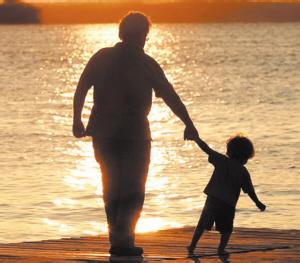I now know he participated in some things vicariously through me, his only son. When I played ball (poorly), he "played" too. When I joined the Navy he "joined" too. And when I came home on leave, he saw to it that I visited his office. Introducing me, he was really saying, "This is my son, but it is also me, and I could have done this, too, if things had been different." Those words were never said aloud.
现在我知道一些事情他是通过我——他唯一的儿子来做的。当我打球时(尽管我打得很糟糕),他也在“打球”。当我参加海军时,他也“参军”。当时我休假,他一定会让我去他的办公室,向人介绍我时,其实他真正想说的是:“这是我儿子,但也是我自己,假如事情不是这样的话,我也会去参军的。”那些话他从来没有说出口。
He has been gone many years now, but I think of him often. I wonder if he sensed my reluctance to be seen with him during our walks. If he did, I am sorry I never told him how sorry I was, how unworthy I was, how I regretted it. I think of him when I complain about trifles, when I am envious of another's good fortune, when I don't have a "good heart".
父亲离开我们已经很多年了,但是我时常想起他。我不知道他是否意识到我曾经不愿意让人看到和他走在一起的心理。假如他知道这一切,我现在感到很后悔,因为我从没告诉过他我是多么愧疚、多么不孝、多么悔恨。每当我为一些琐事而抱怨,妒忌别人的好运,缺乏“善心”的时候,我就会想起我的父亲。
At such times I put my hand on his arm to regain my balance, and say, "You set the pace, I will try to adjust to you."
此时,我会挽着他的胳膊保持身体平衡,并且说,“你走你的,我想法儿跟上你。”













